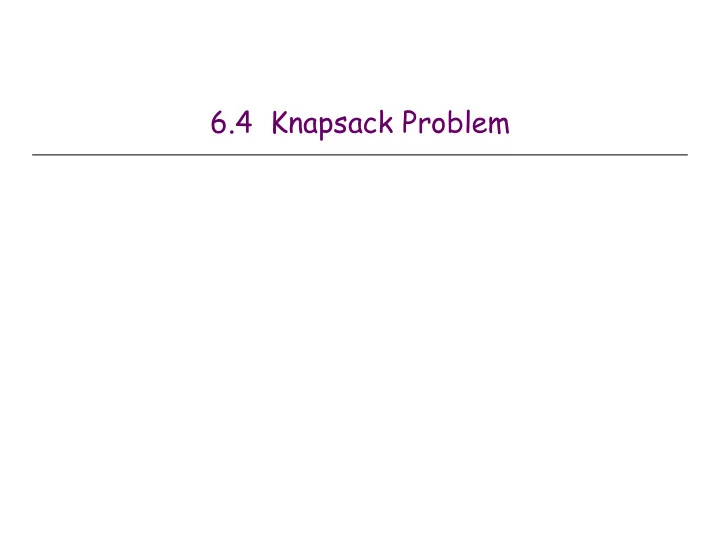

6.4 Knapsack Problem
Knapsack Problem Knapsack problem. Given n objects and a "knapsack." Item i weighs w i > 0 kilograms and has value v i > 0. Knapsack has capacity of W kilograms. Goal: fill knapsack so as to maximize total value. Item Value Weight Ex: { 3, 4 } has value 40. 1 1 1 2 6 2 W = 11 3 18 5 4 22 6 5 28 7 Greedy: repeatedly add item with maximum ratio v i / w i . Ex: { 5, 2, 1 } achieves only value = 35 ⇒ greedy not optimal. 24
Dynamic Programming: False Start Def. OPT(i) = max profit subset of items 1, …, i. Case 1: OPT does not select item i. – OPT selects best of { 1, 2, …, i-1 } Case 2: OPT selects item i. – accepting item i does not immediately imply that we will have to reject other items – without knowing what other items were selected before i, we don't even know if we have enough room for i Conclusion. Need more sub-problems! 25
Dynamic Programming: Adding a New Variable Def. OPT(i, w) = max profit subset of items 1, …, i with weight limit w. Case 1: OPT does not select item i. – OPT selects best of { 1, 2, …, i-1 } using weight limit w Case 2: OPT selects item i. – new weight limit = w – w i – OPT selects best of { 1, 2, …, i–1 } using this new weight limit 0 if i = 0 OPT ( i , w ) = OPT ( i − 1, w ) if w i > w max OPT ( i − 1, w ), v i + OPT ( i − 1, w − w i ) { } otherwise 26
Knapsack Problem: Bottom-Up Knapsack. Fill up an n-by-W array. Input: n, w 1 ,…,w N, v 1 ,…,v N for w = 0 to W M[0, w] = 0 for i = 1 to n for w = 1 to W if (w i > w) M[i, w] = M[i-1, w] else M[i, w] = max {M[i-1, w], v i + M[i-1, w-w i ]} return M[n, W] 27
Knapsack Algorithm W + 1 0 1 2 3 4 5 6 7 8 9 10 11 φ 0 0 0 0 0 0 0 0 0 0 0 0 { 1 } 0 1 1 1 1 1 1 1 1 1 1 1 { 1, 2 } 0 1 6 7 7 7 7 7 7 7 7 7 n + 1 { 1, 2, 3 } 0 1 6 7 7 18 19 24 25 25 25 25 { 1, 2, 3, 4 } 0 1 6 7 7 18 22 24 28 29 29 40 { 1, 2, 3, 4, 5 } 0 1 6 7 7 18 22 28 29 34 34 40 Item Value Weight 1 1 1 OPT: { 4, 3 } 2 6 2 value = 22 + 18 = 40 W = 11 3 18 5 4 22 6 5 28 7 28
Knapsack Problem: Running Time Running time. Θ (n W). Not polynomial in input size! "Pseudo-polynomial." Decision version of Knapsack is NP-complete. [Chapter 8] Knapsack approximation algorithm. There exists a polynomial algorithm that produces a feasible solution that has value within 0.01% of optimum. [Section 11.8] 29
Recommend
More recommend